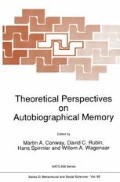Abstract
Personal histories are a primary form of organization in autobiographical memory. They organize temporally distributed experience into thematically-related “streams”. First experience stories are a useful source for identifying the kinds of histories commonly constructed in our society. Two types of histories are examined: histories of skill development and relationship histories. The primary function of first experience memories is structural: they organize histories into distinctive units and establish their causaltemporal sequence. First experiences are also utilized in retrospective and prospective evaluations of self and experience. Some histories are more culturally salient than others. Memories of firsts associated with those histories can indicate the extent to which personal meaning is derived from cultural models, and whether that is a deforming or informing influence. Study of personal histories can provide useful clues about the respective contributions of memory and narrative in organizing experience.
Access this chapter
Tax calculation will be finalised at checkout
Purchases are for personal use only
Preview
Unable to display preview. Download preview PDF.
References
Barclay, C. R., & Hodges, R. M. (1988). Content and structure in autobiographical memory: an essay on composing and recomposing the self. In Acts du Colloque European: Construction et functionement de l’identite. Aix-en-Provence, France: University of Provence. 205–212
Barsalou, L. W. (1988) The content and organization of autobiographical memories. In U. Neisser & E. Winograd (Eds.), Remembering reconsidered: ecological and traditional approaches to memory. Cambridge: Cambridge University Press. 193–243.
Bartlett, F. C. (1932). Remembering. Cambridge: Cambridge University Press.
Belove, L. (1980). First encounters of the close kind (FECK): The use of the story of the first interaction as an early recollection of a marriage. Journal of Individual Psychology, 36, 191–208.
Bower, G. H., Black, J. B., & Turner, T. J. (1979). Scripts in memory for text. Cognitive Psychology, 11, 177 - 220.
Brewer, W. F. (1986). What is autobiographical memory? In D. C. Rubin (Ed.), Autobiographical memory. Cambridge: Cambridge University Press. 25–49.
Bromberg, J. (1981). Having a baby: a story essay. In S. Romalis (Ed.), Childbirth: alternatives to medical control. Austin: University of Texas Press. 33–62
Bruner, J. (1990). Acts of meaning. Cambridge MA: Harvard University Press.
Conway, M. A. (1990). Autobiographical memory: An introduction. Buckingham, England: Open University Press.
Crawford, B. The Louisville Courier-Journal, June 20, pp. B 1 and B3.
Emmons, R.A., & King, L.A. (1989). In R.S. Wyer, Jr., & T.R. Srull (Eds.), Advances in social cognition, Volume II: Social intelligence and cognitive assessments of personality, (pps. 111–122). Hillsdale, NJ: Lawrence Erlbaum.
Gergen, M. M. & Gergen, K. J. (1984). The social construction of narrative accounts. In K. J. Gergen & M. M. Gergen (Eds.), Historical social psychology. Hillsdale NJ: Lawrence Erlbaum Associates. 173–189
Hall, D. F. & Loftus, E. F. (1984). The fate of memory: Discoverable or doomed? In, L. R. Squire & N. Butters (Eds.), Neuropsychology of memory. New York: Guilford Press. 25–32
Harvey, J. H., Flanary, R.,& Morgan, M. (1986). Vivid memories of vivid loves gone by. Journal of Social and Personal Relationships, 3, 359–373.
Harvey, J. H., Agostinelli, G., & Weber, A. L. (1989). Account-making and the formation of expectations about close relationships. In C. Hendricks (Ed.), Review of Personality and Social Psychology, Vol.10: Close relationships. Newbury Park CA: SAGE Publications, Inc. 39–62
Linton, M. (1982). Transformations of memory in everyday life. In U. Neisser (Ed.), Memory observed. San Francisco: Freeman. 77–91
Linton, M. (1986). Ways of searching and the contents of memory. In D. C. Rubin (Ed.), Autobiographical memory. Cambridge: Cambridge University Press. 50–67
Markus, H. & Nurius, P. (1986). Possible selves. American Psychologist, 41(9), 954–969.
McAdams, D. P. (1982). Experiences of intimacy and power. Relationships between social motives and autobiographical memory. Journal of Personality and Social Psychology, 42, 292–302.
McAdams, D. P. (1985). Power, intimacy, and the life story. Homewood IL: Dorsey Press.
Neisser, U. (1985). Toward and ecologically oriented cognitive science. In T. M. Schlecter & M. P. Toglia (Eds.), New directions in cognitive science. Norwood NJ: Ablex. 17–32
Pillemer, D. (1990). Chapters in narratives: evidence from oral histories of the first year of college. Journal of Narrative and Life History, 1, 3–14.
Quinn, D. K. (1990). Freedom on wheels. The Christian Science Monitor, April 19, p.17.
Quinn, N. (1987). Culture and cognition. In D. Holland & N. Quinn (Eds.), Cultural models in language & thought. Cambridge: Cambridge University Press. 3–40
Robinson, J. A. (1981). Personal narratives reconsidered. Journal of American Folklore, 94, 354–396.
Robinson, J. A. & Hawpe, L. (1986). Heuristic uses of narrative thinking. In T. R. Sarbin (Ed.), Narrative thinking: the storied nature of human conduct. New York: Praeger.
Robinson, J. A. & Swanson, K. L. (1990). Autobiographical memory: the next phase. Applied Cognitive Psychology, 4, 321–335.
Rubin, D. C. & Kozin, M. (1984). Vivid memories. Cognition, 16, 81–95.
Schactel, E. (1959). Metamorphosis. New York: Basic Books, Inc.
Schacter, D. L. (1987). Implicit memory: History and current status. Journal of Experimental Psychology: Learning, Memory, and Cognition. 13, 501–518.
Stewart, A.J., & Chester, N.L. (1982). Sex differences in human social motives: Achievement, affiliation, and power. In A.J. Stewart (Ed.), Motivation and society, (pp. 172–218)
Singer, J. A. (1990). Affective responses to autobiographical memories and their relationship to long-term goals. Journal of Personality, 58, 535–563.
Weber, A., Harvey, J. H., & Stanley, M. A. (1987). The nature and motivations of accounts of failed relationships. In R. Burnett, P. McGhee, & D. Clarke (Eds.), Accounting for relationships. New York: Methuen. 114–133.
Author information
Authors and Affiliations
Editor information
Editors and Affiliations
Rights and permissions
Copyright information
© 1992 Springer Science+Business Media Dordrecht
About this chapter
Cite this chapter
Robinson, J.A. (1992). First Experience Memories: Contexts and Functions in Personal Histories. In: Conway, M.A., Rubin, D.C., Spinnler, H., Wagenaar, W.A. (eds) Theoretical Perspectives on Autobiographical Memory. NATO ASI Series, vol 65. Springer, Dordrecht. https://doi.org/10.1007/978-94-015-7967-4_13
Download citation
DOI: https://doi.org/10.1007/978-94-015-7967-4_13
Publisher Name: Springer, Dordrecht
Print ISBN: 978-90-481-4136-4
Online ISBN: 978-94-015-7967-4
eBook Packages: Springer Book Archive

